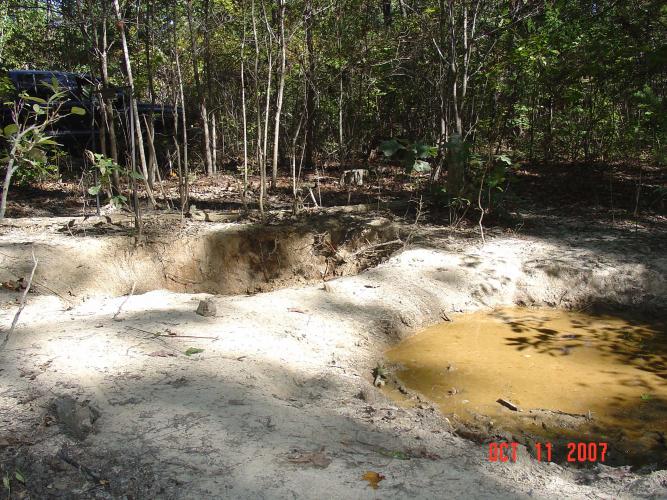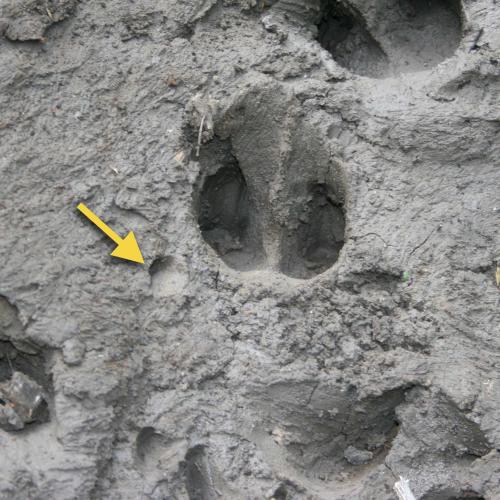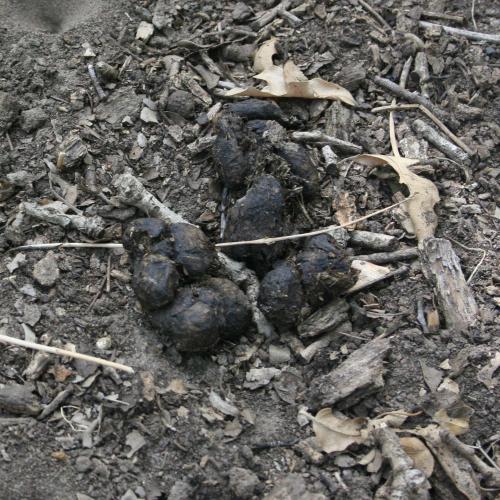Report Feral Hog Sightings and Damage to 573-522-4115 ext. 3296 or Online.
Releasing hogs is illegal. If you see someone releasing feral hogs, report violators to your local conservation agent.
The take of feral hogs is prohibited on conservation areas and other lands owned, leased, or managed by the Department of Conservation. Hunting hogs on other lands is strongly discouraged. Instead, report feral hog sightings to 573-522-4115, extension 3296 or online. The Department of Conservation and the U.S. Department of Agriculture Animal and Plant Health Inspection Service, along with other partners and hundreds of private landowners, are working to eradicate feral hogs in Missouri.
When hunters shoot feral hogs, it complicates efforts to remove these pests. Hogs are social animals that travel in groups called sounders. Shooting one or two hogs scatters the sounder and makes trapping efforts aimed at catching the entire group at once more difficult, because hogs become trap-shy and more wary of baited sites. With their high reproductive rate, removing one or two hogs does not help to reduce populations. Anyone who observes a feral hog or damage caused by feral hogs should report it to the Department of Conservation rather than shooting the animal so we can work together towards eradication.
Dangers To Humans
Feral hogs can be aggressive and have been known to attack humans. But the greater risk is that of contracting diseases through handling tissues of infected hogs. Swine brucellosis and pseudorabies have both been documented in feral hogs in Missouri, and both can affect humans and domestic animals.
Feral hogs are not wildlife and are an invasive, nonnative, destructive species. In Missouri, a feral hog is defined as any swine that is born, living, or has lived in the wild and the offspring of such swine. For purposes of this subdivision, "in the wild" means not confined by humans to pens, houses, or other facilities designed to hold swine and prevent their escape.
Feral Hog Sign
There are a number of signs that indicate the presence of feral hogs. Hogs root around in pursuit of various foods like roots, acorns, and earthworms, plowing the soil to depths of 2 to 8 inches. If several hogs are involved, these rooted areas can stretch over many acres. If you see an area that looks like it has been tilled, chances are feral hogs were the cause. Other indications of hog damage include muddy pits, called wallows, or rubbings low on tree.
Texas AgriLife Extension Service
Title
Financial Loss
A social group of ten hogs can destroy 10-20 acres overnight, including crops, causing financial burdens on Missouri's landowners and agriculture producers.
Damage caused by hogs was estimated at more than $1.5 billion 10 years ago in the United States and is much higher than that today.
Title
Habitat Loss
Feral hogs spend a lot of time rooting and wallowing, behaviors that contribute to soil erosion, reduce water quality, and damage agricultural crops and hay fields, as well as destroy sensitive natural areas such as glades, fens, and springs.
Title
Competition With Wildlife
Feral hogs will eat nearly anything they come in contact with, including many species of native wildlife. They compete directly with native wildlife by eating acorns, a major fall food source for deer, turkey, and black bear.
Feral hogs spend a lot of time rooting and wallowing, behaviors that contribute to soil erosion, reduce water quality, and damage agricultural crops and hay fields, as well as destroy sensitive natural areas such as glades, fens and springs.
Title
Disease
Feral hogs are known to carry diseases such as swine brucellosis, pseudorabies, trichinosis, and leptospirosis. The reintroduction of these diseases into domestic population could be devastating to the agriculture industry.
Feral hogs have been roaming some Missouri counties since the days of open range. The situation took a wrong turn in the 1990s when hog hunting for recreation began to gain popularity. Groups began raising and promoting European wild boar as a form of alternative agriculture and for hunting on captive facilities. It wasn't long before many of these hogs escaped or were released intentionally on public land.
Because feral hogs are highly adaptable animals and prolific breeders, their numbers grow at an alarming rate. One sow can give birth to two litters of about six piglets twice per year, resulting in a population growth rate of about 166% per year. MDC has received damage complaints from private landowners since the late 1990s. Today, feral hog populations are established in over 30 Missouri counties.
Eradicating feral hogs is difficult, but necessary. Populations are isolated and typically in remote, rugged terrain, making locating and killing the hogs difficult. Adding to the problem are illegal releases of hogs on public land or on private land that is not fenced to contain them. If you see someone releasing hogs, report them immediately to the phone number listed above or online.
Concentrated trapping efforts by state and federal employees and private landowner partners have brought some success, but to be effective, trapping efforts need to continue year-round until every hog has been eliminated.
Specific rules and regulations exist regarding feral hogs, and proposed regulation changes are currently under consideration.
Feral hogs have excellent senses of smell and hearing, and they typically avoid contact with humans. However, they have occasionally chased hunters and other outdoor enthusiasts up trees. If you find yourself confronted with a feral hog, the best defense is to climb the nearest tree. If the animal charges, sidestep quickly, taking care to avoid the swing of its tusks, and promptly find a tree to climb.
Landowners with feral hog damage can call MDC for help to eliminate them. A MDC trapper will return calls within one week to discuss the feral hog situation and collect basic information. Then a technician from MDC or USDA will schedule a time to visit the farm and help develop a plan to remove the hogs. This plan typically consists of placing bait to attract the hogs to the best trapping site. Once the hogs are consistently using the bait the technician will set up a trap. If deer or turkey season is underway and someone is hunting the farm a portion of the farm may be closed, with the conservation agent approval, or efforts may pause until the season is over or no hunting is occurring on the farm.
To report feral hogs, call 1-573-522-4115 extension 3296, or report online here.








































